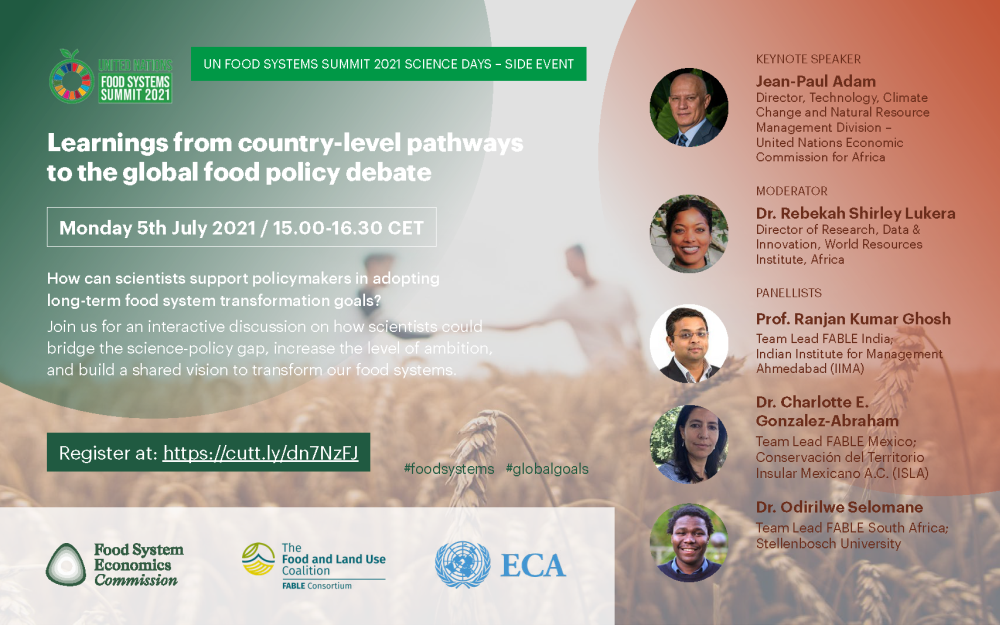
Learnings from country-level pathways to the global food policy debate
On July 5, the Food, Agriculture, Biodiversity, Land-Use and Energy (FABLE) Consortium, the Food Systems Economics Commission (FSEC) and UN Economic Commission for Africa (UNECA), convened an official side event for the UN Food Systems Summit Science Days.
The session titled “Learnings from country-level pathways to the global food policy debate” focused on how scientists can support policymakers in adopting a long-term integrated approach for food systems and increase the level of ambition. The session brought together Jean-Paul Adam, Director, Climate Change, Natural Resource Management and Technology at UNECA; Rebekah Shirley, Director of Research, Data and Innovation, World Resources Institute (WRI) Africa; Dr. Odirilwe Selomane, lead of FABLE South Africa, Dr. Charlotte E. Gonzalez-Abraham, lead of FABLE Mexico, and Dr. Ranjan Kumar Ghosh, lead of FABLE India.
The role of scientists in sustainable food and land use systems
The session centered on the role that scientists can play in strengthening the science-policy interface and helping policymakers adopt an integrated long-term approach towards food and land use systems. The panel presented cases from South Africa, Mexico, and India, where scientists are collaborating with government agencies to assess, and design integrated pathways towards sustainable, inclusive and resilient food and land-use systems.
The panelists built the case for adopting long-term integrated approaches that can help policymakers assess the trade-offs and synergies between short-term policies on agriculture, climate, diets, and biodiversity and midcentury sustainability targets. The presentations underlined the value of stakeholder engagement to ensure that the pathways are technically feasible and that results are owned by all stakeholders. Pathways provide a framework for engaging stakeholders (governments, businesses, civil society, and other scientists), to review, raise questions and recommend improvements for how to achieve the targets. This also contributes to build a societal consensus for the transformations and help raise the level of ambition.
Key takeaways
1. Need for integrated long-term strategies for food and land systems: Countries need long-term integrated strategies that recognize the complexity of our food systems. Integrated assessment models can serve as a tool to support this endeavor. Integrating agriculture, climate, biodiversity, water, trade, and socio-economic indicators into one pathway can illustrate the system-wide implications of certain policies and support government decision-making.
2. Need to promote a transition towards country-driven healthy diets: Panelists agreed on the need for a transformation of agri-food systems that ensures availability, accessibility, and affordability of healthy diets. To ensure healthy diets, countries need to also address inequities, poverty, and food insecurity. To ensure cultural appropriateness, government-led dietary guidelines should not only take into account health and climate but also the agronomic conditions and topography at the national and regional levels. This can help increase the acceptability and accessibility of healthy diets and thus facilitate the transition.
3. Equity should be at the center of this transformation: Climate change is eroding socioeconomic improvements across the globe. African countries spend on average 5%/year of GDP on climate disasters, in some scenarios, climate change might cost up to 50% GDP by 2030. The African Free Trade Agreement is an opportunity to promote economic growth and regional resilience. According to the Report on Green recovery for Africa, investing in energy, food security, and nature solutions can bring the best return in terms of jobs created and value addition in the continent.
However, there are important implications that need to be on governments’ agenda: (i) policies promoting trade liberalization should ensure these benefit national trade balances and smallholder welfare; (ii) science-based evidence needs to be embedded in the trading system, prioritizing food security; (iii) assessment of environmental impacts along the value and trade chain is essential to achieve an equal sustainable transformation.
4. Need to align across sectors: There is increasing awareness and concern among policymakers about the urgency to act and respond to climate change and implement policies that are long-term. However, there is a lack of scientific assessments and tools that are accessible to all policymakers in all countries. Also, policymakers are overwhelmed by immediate political objectives. In addition, there tends to be silos between ministries. E.g., environmental and climate policymakers do not work closely with those working in agricultural and food policy.
Countries need to align their national targets with the global targets on climate and biodiversity. They also need to align their national and subnational policies across food security, biodiversity protection, and climate change accordingly. Integrated pathways can guide policymakers achieve that.